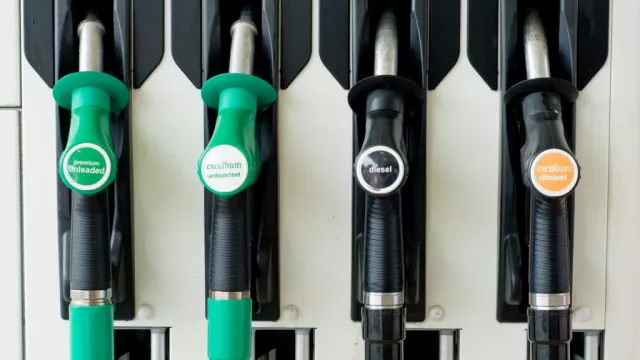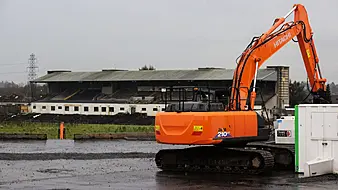A fuel delivery driver was killed in a freak accident after falling into an underground diesel tank on the forecourt of a filling station two years ago, an inquest has heard.
Robbie Slye (64) died from injuries sustained during the incident when he appeared to be overcome by diesel fumes at Tuite’s garage on Cavan Road, Oldcastle, Co Meath on April 6th, 2021.
A sitting of Dublin District Coroner’s Court last week heard the father of four from Clonshaugh, Co Dublin, who worked for Capital Oil, was in the process of opening a manhole to access an underground diesel tank at around 12.30pm when he slumped headfirst into the chamber from a kneeling position.
Although he was rescued from the tank within a minute and was subsequently transported by air ambulance to Tallaght University Hospital, he was pronounced dead later that night at 10.30pm.
The owner of the garage, John Tuite, outlined in evidence how he became aware of the incident when he noticed Mr Slye’s legs sticking out of a manhole in the forecourt. Mr Tuite said he called out for assistance from other workers at the garage and they managed to pull the delivery driver out of the hole.
The witness recalled that Mr Slye was “limp and blue and unresponsive”. He also described how a small amount of liquid had come out of the victim’s nose and mouth
However, Mr Tuite said Mr Slye started to breathe again after CPR had been carried out. “He was looking good and appeared to be doing well,” he added.
Underground tank
The inquest heard that CCTV footage which captured the incident showed Mr Slye had been in the hole for 40 seconds before he was spotted by Mr Tuite, and was pulled out within a minute of falling in.
In response to questions from the coroner, Dr Clare Keane, the witness said he had never experienced such an event in a lifetime of operating the service station.
Mr Tuite said the underground diesel tank was in use all the time, with deliveries being made every 7-10 days.
He said Mr Slye, who regularly delivered fuel to his garage, had already spent half an hour filling other tanks on the day without incident.
Another man who helped in rescuing the driver said Mr Tuite’s head had been fully immersed under “black water” in the chamber.
The inquest heard the chamber was about three feet deep with around one foot filled with water with a film of diesel on top.
A firefighter who happened to be passing the garage, Nicky Brunton, said the victim initially had no pulse but started to breathe again without ever regaining consciousness.
An inspector with the Health and Safety Authority (HSA), Stephen McGarry, who investigated the circumstances of Mr Slye’s death, said the underground tank was of standard construction and design dating from 1937.
Mr McGarry said the driver had already carried out 11 deliveries to Mr Tuite’s garage in the preceding 12 months.
The HSA inspector said that although it was undesirable to have water in the chamber accessing the diesel tank, it was almost impossible to avoid given the Irish weather and the prevalence of rainwater and run-off, even with newer, more modern tanks.
He told Dr Keane that he had never come across a similar incident in some 21 years working with the HSA.
Mr McGarry said safety guidelines around fuel tanks at forecourts were more focused on petrol, as it was more highly flammable than diesel.
In response to the concern of members of Mr Slye’s family about the volume of diesel that might have been present in the chamber, the HSA inspector said he believed there would only be a small amount of fuel which would arise from the coupling and uncoupling of a pipe used to fill the tank.
Mr McGarry said he believed it was “unlikely” that the victim could have been overcome by diesel fumes as he was not operating in an environment where there would have been dense fuel vapours to have made him “deficient in oxygen”.
He acknowledged that the type of incident which occurred had not been foreseeable and had not been the subject of any risk assessment by the HSA. “It would be very difficult to legislate for what happened,” he remarked.
Responsibility
The inquest heard that responsibility for inspection of forecourts had passed in recent years from the HSA to the fire officers of local authorities.
The inquest heard the HSA concluded no prosecution was warranted as there had been no breach of any health and safety regulations.
Several relatives of Mr Slye claimed he would not have ingested any fuel if there had been no liquid in the chamber or if a safety cage had been fitted to prevent him from falling into it.
The victim’s son, Eamonn Slye, who also worked with Capital Oil, said they wanted to ensure that measures were taken which could save another person’s life in similar circumstances.
He told the coroner he had spoken to his father on the phone about 20 minutes before the fatal incident.
Mr Slye said his father, who suffered from asthma, was fine and had gone back to work after having earlier attended the Mater Hospital in Dublin for a Covid vaccination.
Post-mortem results showed Mr Slye died as a result of multi-organ failure which was most likely due to exposure to diesel. A jury of five women and one man returned a verdict of accidental death.
Dr Keane endorsed a recommendation made by the jury that consideration be given to installing a safety grid to the access chamber of underground fuel tanks where possible which could be removed for cleaning, access and maintenance and which could be relocked into position on completion of such work.







